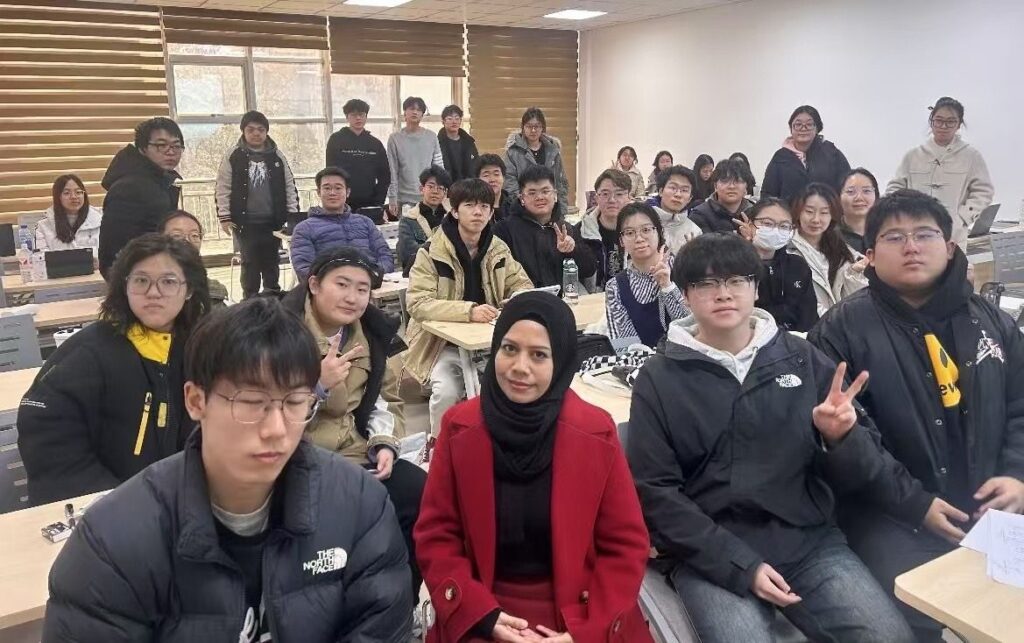What teaching in China taught me about Malaysian’s fear of English
By Shazlin Niza Ab Razak

In the heart of Xi’an, a city steeped in history and culture, I stepped into a classroom filled with university students eager to learn English. I was there on academic duty, representing University of Malaya to teach English as part of an international collaboration. Their spoken sentences were far from flawless. Vocabulary was often misused, tenses were inconsistent, and their expressions occasionally bore the marks of direct translation. Yet they spoke. They asked questions, participated freely, and engaged without inhibition.
As a Malaysian English lecturer, I found the experience both stirring and eye opening. These students lacked native fluency and grammatical finesse, yet they wielded a far greater asset, unshakable confidence. They spoke with earnestness and audacity, embodying the truth that language is not a measure of precision, but a but a conduit for authentic communication.
This experience illuminated a poignant contrast with what I often witness in Malaysia. English is embedded early in our national curriculum. It is taught from preschool and rigorously assessed in public examinations such as the Sijil Pelajaran Malaysia (SPM) and the Malaysian University English Test (MUET). English is present in signage, media, and entertainment. We are, in many ways, surrounded by it.
According to the EF English Proficiency Index 2024, Malaysia ranks 25th globally among 113 countries, placing us among the most proficient English users in Asia. This is no small feat. Yet ironically, a pervasive hesitation still clouds our collective ability to speak the language. Why does this contradiction exist?
The answer lies in our educational culture. In Malaysia, English is primarily treated as an academic subject rather than a living, breathing means of communication. From a young age, students are trained to memorize grammar rules, compose structured essays, and ace multiple-choice tests. Speaking, however, is often limited to rehearsed oral assessments and rarely fostered in everyday classroom interaction.
Mistakes, rather than being seen as natural stepping stones to fluency, are often met with correction, criticism, or even ridicule. A mispronounced word can provoke laughter. A grammatical error may attract scorn. This climate of judgment silences learners long before they have the chance to find their voice.
In China, I saw a different philosophy in practice. Despite English not being widely used in their daily lives, students were consistently encouraged to speak. They were not waiting to be perfect before participating. Teachers there emphasized the importance of interaction and self-expression, welcoming flawed attempts as part of the learning process. There was space to make mistakes, and more importantly, space to grow from them.
This stark divergence revealed an essential truth, fluency is not born out of faultlessness. It emerges through courage, through practice, and through repeated efforts to be understood. A speaker who dares to try, even imperfectly, is already progressing. The fear of speaking, by contrast, halts learning before it begins.
If Malaysia is to advance meaningfully in English communication, we must interrogate our own priorities. We need to ask whether our classrooms nurture expression or merely enforce compliance. Do our students learn to speak with clarity and confidence, or are they simply learning to pass?
The time has come to reframe our goals. We must shift the focus from linguistic exactness to communicative competence. Our students should not be conditioned to believe that errors signal failure. On the contrary, they must be taught that every attempt is a sign of progress, and every mistake a mark of courage.
To encourage Malaysians to speak English more confidently, we must cultivate supportive environments in both educational and social contexts. Classrooms should integrate more spontaneous speaking tasks, role-playing, and peer conversations. Teachers should model patience, rather than perfectionism. Parents too can play a role, by allowing English to be spoken freely at home without correction becoming a source of shame. Public campaigns and national media could highlight relatable stories of everyday Malaysians using English, celebrating authenticity over accent, and effort over elegance.
Workplaces, too, have a role to play. By fostering bilingual expression during meetings and investing in English upskilling programs that prioritize real-time communication over rote drills, they can help dismantle the culture of linguistic fear. We must begin to normalize learning through experience, not just through textbooks. Yet, despite our efforts, the fear still lingers. Why?
Malaysia has never been starved of English lessons, textbooks, or media exposure. What we lack is the freedom to falter. For too long, we have taught our learners that a misplaced verb or a mispronounced word is something to fear, something shameful. The result is a generation that knows the rules but hesitates to speak. Not because they are incapable, but because they are afraid of being laughed at, corrected, or dismissed. This fear is not a reflection of one’s intellect, but of a system that punishes imperfection. It is a failure of how we have made English feel like a test of worth instead of a bridge to be crossed.
For that, I am deeply grateful. Teaching in Xi’an did more than show me how language is learned. It reminded me of what it means to try without fear. My students there, with all their imperfections, taught me courage in its purest form. They spoke not to impress, but to connect. And in doing so, they rekindled my hope that Malaysian learners, too, can find their voices, if only we create the space for them to speak.
So, fellow Malaysians, step beyond your comfort zone. English should never be a gatekeeper. it should be a gateway. And it is time we opened that gateway wide, not just with knowledge, but with empathy, patience, and the audacity to speak.

The author is the English Language Lecturer at the Centre for Foundation Studies in Science (PASUM), Universiti Malaya

